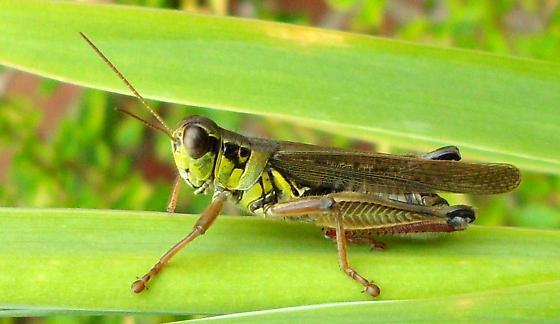
Climate Change May Favor Large Plant Eaters Over Small Competitors
December 19, 2017

|
|
A new study shows that climate change that significantly decreases plant quality grants a competitive advantage to larger invertebrate herbivores, such as grasshoppers, who can convert the foliage to energy more efficiently than smaller herbivores. ©2011 Andrew v. F. Block |
KNOXVILLE—In the drive to survive changing climates, larger herbivores may fare slightly better than their smaller competitors, according to new research from the National Institute for Mathematical and Biological Synthesis and the Yale School of Forestry and Environmental Studies.
Scientists have generally expected animals to get smaller as the planet warms, as research on the interactions in food webs has focused mainly on the effects of temperature. But the new study accounts for more climate variables, not just temperature, that could come into play, including atmospheric carbon dioxide levels and rainfall patterns.
The key factor appears to be plant quality.
In the study published in the journal American Naturalist, researchers developed a model based on food web interactions among plants, grasshoppers, and spiders exposed to multiple changing climate variables. The variables interact and influence plant nutritional quality, which in turn affects the herbivorous grasshoppers and the shared predator—the spiders.
The model shows that climate change that significantly decreases plant quality grants a competitive advantage to larger invertebrate herbivores, such as grasshoppers, ants and other insects, which are able to convert the foliage to energy more efficiently than smaller herbivores.
Temperature and moisture rather than atmospheric carbon dioxide appear to have the most influence.
The results suggest that climate change could predict increased body sizes in some cases.
"Global climate change involves not just a warming planet, but also increased atmospheric CO2 concentrations and changes in rainfall," said lead author Lauren Smith-Ramesh, a postdoctoral fellow at NIMBioS. "All these factors should be taken into account when making predictions about how animal size will respond."
The study's authors do not claim that the effect will be universal, noting that plant responses to climate change can be highly variable and context dependent, which in turn influences herbivore growth and development.
Citation: Smith-Ramesh LM, Rosenblatt AE, Schmitz OJ. 2018. Multivariate climate change can favor large herbivore body size in food webs. American Naturalist. http://dx.doi.org/10.1086/695768 [Online]
Media Coverage Highlights
Science Daily:
Climate change may favor large plant eaters over small competitors
phys.org:
Climate change may favor large plant eaters over small competitors
#
The National Institute for Mathematical and Biological Synthesis is an NSF-supported center that brings together researchers from around the world to collaborate across disciplinary boundaries to investigate solutions to basic and applied problems in the life sciences.
CONTACT:
Catherine Crawley, NIMBioS, +1-865-974-9350, ccrawley@nimbios.org
Lauren Smith-Ramesh, NIMBioS, +1-865-974-4980, lsmithramesh@nimbios.org
NIMBioS
1122 Volunteer Blvd., Suite 106
University of Tennessee
Knoxville,
TN 37996-3410
PH: (865) 974-9334
FAX: (865) 974-9461
Contact NIMBioS


